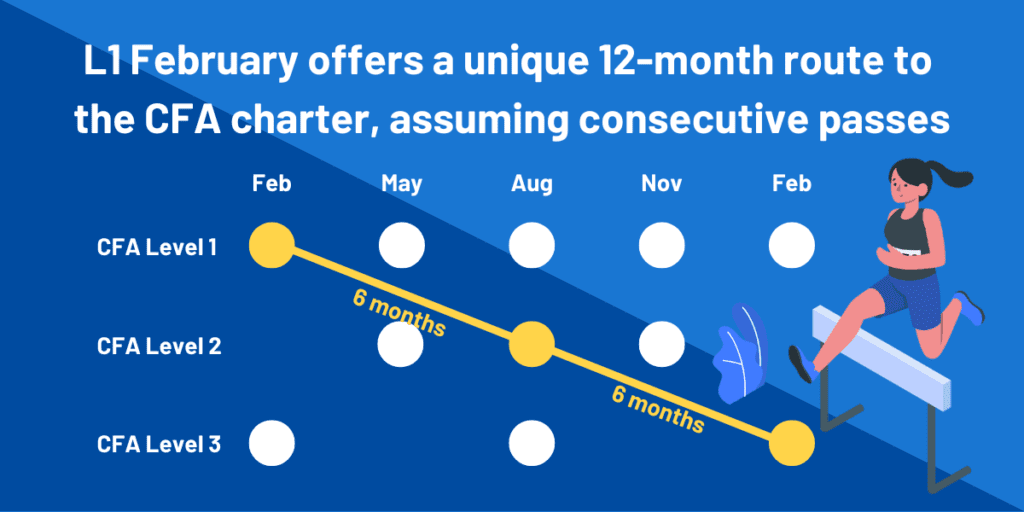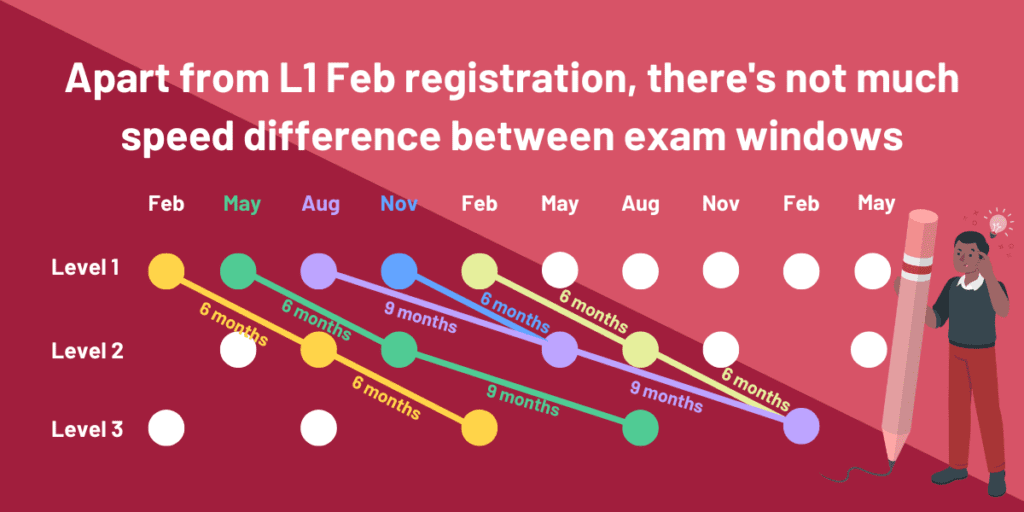It takes an average of 1,000 study hours to obtain a CFA charter, so it is worthwhile investigating the most efficient way to pass before signing up. While there are no shortcuts nor exemptions, there are things you can do to tip the odds in your favour.
Having completed my CFA exams in 18 months years ago (see my Level 1, Level 2 and Level 3 experiences), I hoped this can be replicated for those who think it is a desirable goal.
This article shows you:
- what is the minimum time to complete CFA exams, i.e. the fastest path, given the new CFA exam cycles;
- how long does it take to get a CFA charter, on average;
- how to customize a Fast Track study plan that works for you, depending on whether you’re a student, full-time working professional and/or a parent.
What is the fastest route to complete the CFA charter?

Our CFA Fast Track plan maps out the fastest current route available to complete and pass all 3 levels of the CFA exams.
Just as a reminder, here is the new CFA exam windows going forward:
- Level 1 (4x a year): Feb, May, Aug and Nov.
- Level 2 (3x a year): May, Aug and Nov.
- Level 3 (2x a year): Feb and Aug.
With the new testing schedule, studying for CFA Level 1 in February represents the best chance of completing all 3 CFA exams the fastest, i.e. in 1 year, assuming consecutive passes. This is done by passing CFA Level 1 in February, CFA Level 2 in August and then CFA Level 3 in February the following year.
Otherwise, there isn’t much difference with other Level 1 registration windows as they are similar in length.
We recommend 6 months of studying per level to minimize fail chances, which is the biggest setback you can risk.
Therefore, the quickest (practical) way to a CFA charter is about 12-18 months, from starting Level 1 to finishing Level 3. This assumes 6 months’ study per level and consecutive passes when pass rates are averaging less than 50%.
Although the 2021 switch to computer-based testing for all Levels meant that CFA charter can be completed faster, significant study time for each level is still needed, so the Fast Track length is unlikely to change much.
What is the average time to complete CFA program?
On average, a typical CFA candidate takes 4+ years the complete the CFA program. That said, this is based on pre-2021 data before computer-based testing.
With the new, more frequent CFA exam cycles, this figure may change in a few years time assuming candidate quality is the same. Let’s take a look at the fastest path possible to a CFA charter next.
CFA fast track plan: FAQ and key considerations
Fast tracking the CFA charter is not for the faint-hearted, as it requires serious sacrifice with no guarantee on results.
There are a few things you need to consider before committing to the CFA Fast Track Plan to increase your chances of success.

Ready to commit? Here’s your customized CFA fast track plan

To increase your probability of success with the CFA Fast Track Plan, the first step is to set aside enough study time given your personal circumstances.
Failing to plan is planning to fail.
To do this, tailoring your Plan with the free 300 Hours Study Planner is crucial.
It’s a simple but effective planning and progress tracking tool available to all CFA exam candidates. The key input to this planner is the date you start studying for your exam, depending on which of the following broad candidate profiles you fit into:
The CFA fast track plan for full time students
- Who this Fast Track plan is for: You’re likely still attending classes in university, and able to spare a comfortable 3 hours a day (including weekends) to revise.
- When you should start studying for the CFA exam: Your optimal study period is to start 4 months before the exams, as you are training yourself to focus on 3 hour blocks from the start.
- Additional Fast Tracktips for full-time students:
- If 3 hours daily is too much, you may be able to start your revision earlier, but not more than 6 months before exam day (2 hours a day on average).
- If you start too early, you may lose momentum halfway and struggle with retaining the material you’ve studied at the start.
The CFA fast track plan for working professionals
- Who this Fast Track plan is for: Full-timers in a demanding job, working long hours most weekdays. No young family commitments.
- When you should start studying for the CFA exam:
- The ideal time to start studying is 6 months prior to the exam, aiming for 14 hours of study time per week, however you want to split it across the 7 day week.
- Additional Fast Track tips for full-time professionals:
- A balanced plan is to aim to study 1-2 hours per day on weekdays, and catch up on the remaining hours on weekends.
- Weekends only? No problem. If you can’t study on weekdays, be a “weekend warrior” and dedicate 7 hours per day on the weekends (this was the plan I used)
- Rinse and repeat. Cultivate a good long-term habit by making your study sessions a routine – stick to the same time each weekday and weekend.
- Ramp up: Lengthen your study sessions to at least 3 hours during the last month to train your focus for exam day. This should happen naturally as you move to practicing timed mock exams.
The CFA fast track plan for working parents
- Who this Fast Track plan is for: Full-time working parents juggling work and family commitments. Adding CFA exams into the mix isn’t going to be fun, but we can show you how to best do it.
- When you should start studying for the CFA exam: The ideal time to start studying ranges from 6-9 months prior to the exam, depending on your time commitments.
- Starting 6 months prior, aim to study 14 hours a week
- Starting 7 months prior, aim to study 11.5 hours a week
- Starting 8 months prior, aim to study 10 hours a week
- Starting 9 months prior, aim to study 9 hours a week
- Additional Fast Track tips for full-time working parents:
- Don’t start too early. Starting earlier than 9 months prior is not ideal – the pace would be too slow and there will be issues recalling studied material. Exceptions to this would be if you had planned for a long holiday, or some family time away for a newborn’s arrival.
- Ramp up: Lengthen your study sessions to at least 3 hours during the last month to train your focus for exam day. This should happen naturally as you move to practicing timed mock exams.
Final tips for all CFA candidates
- Use our Free study plan. Regardless which profile you fit into, the recommended study pace ensures that you will have sufficient time to cover the study materials and do a proper review, if you stick to the study plan and use it to track your progress.
- Pace yourself, don’t burn out. Remember that the CFA exams – especially if you are aiming for the Fast Track Plan – is a marathon and not a sprint. Pacing yourself and not burning out over the years is important.
- Gather support. Do have the talk with your partner, friends and family about the study commitment you need to pass all the exams, and make time for them when you can. Support from the people around you is crucial to getting through the CFA exams.
- Establish a consistent, regular study habit. Breaking the big task of digesting all the CFA materials into small daily goals does make the insurmountable seem achievable (and it is!).
- Practice mocks. Don’t forget to earmark the last 4-6 weeks before your exams for doing practice papers, ideally under timed conditions. If you are working, take 1 week off before the exams. I’ve done this myself for all my CFA exams – it helps a LOT with last minute revision sessions.
So there you have it – just my two cents on passing all the CFA exams in the fastest possible way. I hope you all found this helpful, let me know if you have questions in the comments below.
Meanwhile, you may find these other articles and resources useful:
- Plan Your CFA Exam Registration with Our Journey Planner
- CFA Level 1: How to Prepare & Pass In 18 Months
- CFA Level 2: How to Prepare & Pass In 18 Months
- CFA Level 3: How to Prepare & Pass In 18 Months
- How to Recognize, Cure and Prevent CFA Exam Burnout
- 5 Techniques to Read and Study 3x Faster
- Free 300 Hours CFA Study Planner
- Free 300 Hours Guides, including the 10 Commandments

Hi
Is it possible to reschedule the exam to next session instead of the booked session e.g. Moving to May instead of Feb.
Hi Nathan, that is considered a Deferral request, and you’ll need to contact CFA Institute and there is a cost to this deferral (unless deemed emergency under their rules). Check out our CFA deferral policy summary here.
Hi Michael, thank you for this invaluable info. I am going for Feb, Aug, Feb route. Did you have prior finance knowledge? On average, how long before exams did you finish reading through the material. I would also be interested in your study plan if you still remember. Thanks
Hello,
I had to reschedule my Level 1 Dec 2020 to July 2021 and would like to ask what would be the fastest way to pass all three exams?
Would I be done with all 3 exams if I write the Level 2 this year and Level 3 next year or would that be no difference if I write Level 2 in May 2022 and Level 3 at the end of 2022?
Hope you can help me to find out the fastest way to pass all three exams.
Thank you very much!
Hi Michael, the fastest way to pass the CFA exams is for 3 consecutive passes. Do use our CFA journey planner tool to map out your quickest path, applying the 6 months gap between exams.
So in your case, assuming all goes well for you, your fastest path would be L1 July21, L2 Feb22 then finally L3 Nov22.
Hope this clarifies!
Yes it does. Thank you so much for the fast reply Sophie!
Would just like to clarify that there is an exam date on November 2021 for CFA level 2?
I have checked CFA and other website – there is no such exam date for level 2.
Can you please clarify. Thank you!
Yes, there will be a Nov21 for L2, details are just not confirmed yet. From CFA Institute:
—-
Level II and Level III Candidates
For December Level II and Level IIII candidates whose locations have been closed, you may register for any applicable 2021 exam. If you would like to sit in May (LII and LIII), August (LII) or November (LIII), you may register now.
In addition to the current available windows, we will be adding more testing windows in 2021 for LII and LIII candidates. New windows will be scheduled for August (LIII) and November (LII).
More information will be shared soon regarding registration for new windows.
—
Hope that helps!